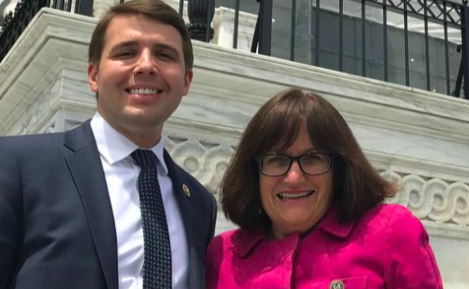U.S. Reps. Annie Kuster and Chris Pappas joined a majority of Democrats in passing a bill giving the Biden administration the power to control the price of gasoline, a move most economists dismiss as a “gimmick” — or worse.
The measure, called the Consumer Fuel Price Gouging Prevention Act, makes it “unlawful for any person to sell a consumer fuel at a price that is unconscionably excessive” if the president declares an “energy emergency.” It passed the same day average gas prices hit an all-time high of $4.59 per gallon. That is $1.55 higher than a year ago.
The bill also would expand the power of the Federal Trade Commission to investigate and enforce the new law.
Pappas promptly sent out a press release: “Pappas’s Anti-Inflation Legislation to Hold Oil Companies Accountable for Ripping Off Consumers Passes House.”
“It’s unacceptable that while Americans struggle to make ends meet gas and oil companies are taking advantage of international crises to make record profits,” Pappas said in a statement. “We have to put an end to this corporate profiteering and give families relief.”
Asked why, if “corporate profiteering” can drive gas prices to record highs, Big Oil companies let them drop below $2 per gallon during the Trump administration, Pappas declined to answer. He also wouldn’t say what price per gallon he considered “unconscionably excessive.”
Energy experts pushed back on the Pappas’ policy.
“The voters of New Hampshire want relief at the pump, not finger pointing,” said Tom Pyle with the American Energy Alliance. “Unfortunately, Congressman Pappas is in lockstep with Speaker Pelosi and President Biden in playing the blame game for high gas prices instead of promoting policies that encourage more production here at home.”
Blaming gas prices on unfounded allegations of oil company collusion is just the latest Democratic strategy to deal with high gas prices. At the White House this week, Biden spokesperson Karine Jean-Pierre was still trying to blame the “Putin Price Hike” for rising prices.
Based on the latest polls, it is not working.
A new national poll conducted by UMass-Amherst found, “White House efforts to deflect blame for high gas prices onto Vladimir Putin have made less of an impression on voters than Democrats hoped,” said Paul Musgrave, assistant professor of political science at UMass Amherst and an expert on U.S. foreign policy. “More than twice as many respondents in the new poll blame President Biden for the high prices of gas and groceries as Vladimir Putin.”
And the Big Oil price-fixing canard has been repeatedly debunked, including by the Federal Trade Commission (FTC), which investigated alleged market manipulation of gas prices under Presidents Clinton, Bush, and Obama. It never found evidence of collusion — yet another hoax that made its way into American politics.
Many of Pappas’ fellow Democrats dismissed his anti-gouging approach as an unserious stunt.
Rep. Stephanie Murphy (D-Fla.) voted against the bill, saying the price controls could make the gas price problem worse. “It’s not a good idea to implement price controls so I’m concerned about the potential unintended consequences.”
“Price controls can of course control prices — but they’re a terrible idea,” said MIT Economics Professor David Autor earlier this year.
Drew Cline of the Josiah Bartlett Center for Public Policy, a free-market think tank, mocked the legislation.
“Wait, are they expecting us to buy the price gouging claim? Again? That’s disappointing. Prices are high because demand is high and global supply is low. Congress could take steps to remove barriers that make it harder to produce and transport oil and gas. But I guess they’d rather shift the blame by dusting off the old, bogus price gouging attack.”
And prominent Democrat economist Larry Summers, credited for accurately predicting the surge of inflation fueled in part by federal spending, rejected the approach as “dangerous nonsense” and “diversionary confusion.”
During the last bout of serious inflation in the U.S. economy, President Richard Nixon tried to use government price controls to stop soaring costs. The result, according to Daniel Yergin and Joseph Stanislaw in “The Commanding Heights: The Battle for the World Economy,” “Ranchers stopped shipping their cattle to the market, farmers drowned their chickens, and consumers emptied the shelves of supermarkets.”
NHJournal asked Pappas if he was familiar with the previous FTC investigations of gas prices or the economic scholarship showing the theory is unfounded. Again, he declined to answer.


